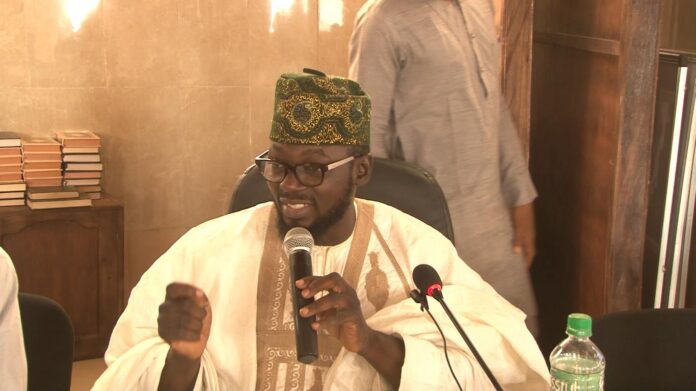Justice Abdurraheem Sayi, the Qadi of the Shari’ah Court of Appeal in Kwara State, has asserted that Muslims in the region do not require the approval of state authorities or traditional rulers to establish and operate Shari’ah arbitration panels. He described objections to these panels as “legally baseless” and a reflection of Islamophobia, which he claimed had been intentionally ignored by the affected states.
Justice Sayi made these remarks while delivering a lecture on “Shari’ah in South-West Nigeria” at the University of Lagos (UNILAG) on Sunday, February 25, 2025. The lecture, titled “The Transformative Power of Ramadan,” was part of the University of Lagos Muslim Alumni 30th Pre-Ramadan Lecture series and was attended by prominent dignitaries, including Lagos State Deputy Governor, Obafemi Hamzat, and Ogun State Deputy Governor, Noimot Salako.
The lecture aimed to clear misconceptions surrounding Shari’ah law and arbitration in Nigeria, with Justice Sayi addressing some of the most pressing concerns about the system and its operation in the South-West.
Justice Sayi took a strong stance against objections raised by some quarters of the society, particularly in the South-West, to Shari’ah arbitration panels. He clarified that the establishment of arbitration panels was a contractual matter, and as such, did not require the approval of state authorities, monarchs, or religious bodies.
“There is no confusion in the Nigerian Constitution,” Justice Sayi said during his lecture. “Arbitration is by contract. Nobody needs the approval of the Federal Government to operate it. As powerful as the President is, his authority does not extend to approving the Constitution of an arbitration panel. It is purely contractual.”
The judge further explained that Muslim individuals and associations have the right to establish arbitration panels to resolve disputes involving their members, and these panels can hold their sittings in mosques. He questioned why there was any opposition to the establishment of such panels, stating, “What business do pastors or monarchs have in this matter? Somebody should tell the monarchs to know their boundaries.”
Justice Sayi also sought to clarify the role of Shari’ah arbitration panels, explaining that these panels are not intended to replace formal courts. Instead, they function based on voluntary participation, and once a person attends a proceeding, the decision made by the panel becomes binding.
“Shari’ah arbitration panels are not substitutes for courts,” he said. “They function by contract, where attendance is voluntary; however, once a person participates in the proceedings, the decision becomes binding.”
Despite the widespread belief that Shari’ah arbitration could be seen as an alternative to state-run legal structures, Justice Sayi stressed that Muslims in the South-West deserve a formal legal framework that allows them to handle matters related to family law, such as marriage dissolution, child custody, and inheritance, in line with Islamic principles.
Justice Sayi also addressed the broader issue of Shari’ah courts in the South-West, calling on state governments to allow for the establishment of these courts to give Muslims a sense of belonging and provide a legal framework for resolving family matters.
“There is no single provision for Muslims in the family laws of the South-West,” he pointed out. “It’s as if we are second-class citizens or do not belong to these states. There is no single court in the region competent to dissolve an Islamic marriage or handle child custody cases following Islamic law. Shari’ah is a fundamental right of Muslims.”
The judge highlighted that the lack of Shari’ah courts in the South-West states, including Lagos, Ogun, and Osun, is a glaring oversight, especially considering the significant Muslim population in these states. He urged the governments to recognise the need for these courts, which would operate alongside the existing judicial system, to address the unique personal and family issues of Muslim residents.
Justice Sayi referenced the Arbitration and Mediation Act of 2023, which grants private citizens the right to form arbitration panels and determine the legal framework that governs them. He explained that the law supports the establishment of such panels by associations, including political parties, to resolve disputes among their members.
“Associations, including political parties, can establish small committees to resolve disputes involving their members,” Justice Sayi said. “The law allows Muslims to create their own panels, which do not require the approval of state authorities.”
He highlighted how Shari’ah arbitration has proven effective in Lagos, revealing that on multiple occasions, High Court judges have referred cases to independent Shari’ah panels when they were unable to provide resolutions themselves. This demonstrates the need for such panels and the positive impact they have in resolving personal and family disputes.
Justice Sayi did not shy away from addressing the root of the opposition to Shari’ah arbitration panels in the South-West. He called out the “Islamophobia syndrome” that he believes fuels much of the resistance against these panels. According to him, many of the objections are based on misconceptions and a lack of understanding of Islamic legal traditions.
“Objections to Shari’ah arbitration panels are legally baseless, an embarrassment to legal minds, and a mere expression of Islamophobia,” he said, calling on the governments of the South-West to engage in dialogue with Muslim leaders and understand the legal basis for these practices.
He stressed that the opposition to Shari’ah courts and arbitration panels could only be seen as a deliberate attempt to deny Muslims their fundamental rights. “We should not be treated as second-class citizens,” he concluded.
The lecture also included a presentation from Professor Mashood Baderin of the University of London’s School of Oriental and African Studies. He spoke on “Islam at the Intersection of Humanity and Religion,” urging Muslims to demonstrate their faith in ways that positively impact society.
Professor Baderin highlighted the importance of unity and tolerance, encouraging Muslims to uphold the five pillars of Islam and to engage with society in ways that benefit all. His message of peace and cooperation resonated with the audience, highlighting the need for mutual respect and understanding among Nigeria’s diverse religious communities.

